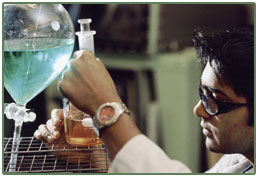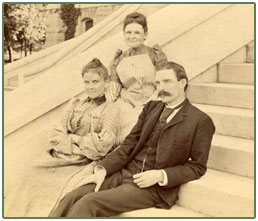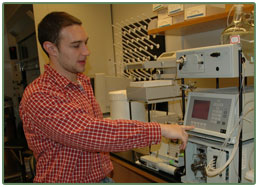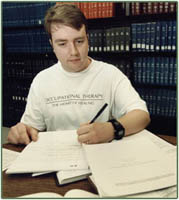 |
 |
|
|
|
Graduate Program
Vanderbilt offers to able and serious students a faculty that is active in research and deeply committed to the development of scholars. Students participate in classroom, laboratory, tutorial, and collegial modes of learning and in systematic independent inquiry, in a setting that allows them to see scholars at work, day in and day out, as an important means of learning the scholar's art. Students are in situations in which they are known personally and well, and concern for what happens to them is very strong. Vanderbilt University chemistry graduate students work in ultramodern labs as part of a curriculum combining solid research, intensive training, and exceptional education. This accelerated program enables graduated students to leave Vanderbilt with outstanding, ACS-accredited, professional degrees prepared for highly competitive careers in respected research universities, private and public sector laboratories, industry, and patent law. The outstanding research facilities at Vanderbilt University offer graduate students an excellent opportunity to gain hands-on experience in state-of-the-art experimental techniques. As chemical research becomes more sophisticated and interdisciplinary, an increasingly broad range of instrumental techniques is required to advance scientific knowledge.
Interdisciplinary research in chemistry is available with particular emphasis on biological chemistry, environmental chemistry, materials chemistry, and nanotechnology. Interdisciplinary programs include Research at the Chemistry/Biology Interface for students who wish to pursue a doctoral career at the chemical and biological sciences interface, and the Chemical Physical Biology Program for students who wish to pursue a doctoral degree at the interface of the chemical, physical, and biological sciences. Three new interdisciplinary programs, the Vanderbilt Institute of Nanoscale Science and Engineering (VINSE), the Vanderbilt Institute for Integrative Biosystems Research and Education (VIIBRE) and the Vanderbilt Institute of Chemical biology (VICB) provide exceptional opportunities for highly motivated graduate researchers. 
Coursework and Examinations Prior to class registration, entering students take placement examinations to aid in selecting courses and possibly qualify students to complete some courses by examination. Faculty research supervisors then assist students in selecting courses, which can include offerings from other graduate departments. Students complete at least 24 hours of coursework including 3 seminar hours, normally finishing all coursework within their first 3 semesters. See graduate course offerings in the current VU Grad catalogue. Students complete General Proficiency Examinations during their first year and a Ph.D. qualifying examination before the end of their second year of graduate study. Research Requirements Students select a research director during their first year after completing 3 lab rotations in research groups of their choosing. From their second year onward, students meet semiannually with Academic and Research Monitoring (ARM) Committees, which monitor research progress. Students present their research in annual seminars beginning in their second year. During their fourth year, students present and defend an Independent Research Proposal. The program design enables students to graduate with a professional degree within 4 years. Students conclude their Ph.D. program when they pass informal and public defenses of research results. 
Admissions The application deadline for admission to our Fall 2006 class is January 15, 2006. We have a very aggressive recruiting process which allows for applications to be reviewed as they are completed. Thus, early application is not only encouraged, but often results in early admission decisions. All applicants are considered for admission with a financial award in the form of either a teaching or research assistantship. For the 2005/2006 academic year, these awards included a stipend of $20,000.00, Vanderbilt student health service benefits, individual major medical insurance coverage and a full tuition waiver valued at $30,992 per year. Additionally, graduate student candidates are considered for a number of University, School and Departmental special fellowships. Financial Assistance Chemistry graduate students receive support as teaching assistants (TAs) or as research assistants (RAs). Both TAs and RAs receive the same, generous, twelve-month stipend including annual incremental increases to this stipend. The Department or faculty research support provides for graduate tuition and an individual health insurance premium. Based upon the incremental stipend, tuition, and health premium increases during the past five years, we anticipate, at minimum, a stipend of $ 20,000 during the 2006/2007 academic year, a 100% tuition waiver of $30,992 per year and paid annual health insurance premiums of approximately $1,895. Teaching assistants typically teach two 3-hour undergraduate laboratories per week, hold office hours, and grade laboratory reports and lecture course examinations. This teaching load typically requires an average of 12 hours of TA duty per week. Faculty research support typically provides for RA positions, which usually become available to students after the first year of study.
All merit awards are available through competitive review. The Department nominates applicants for 4-year awards offered by the Graduate School (University Graduate Fellowship, Harold S. Vanderbilt Graduate Fellowship, Graduate Select Scholarship in Arts and Science, or the Dean's Graduate Fellowship), which add to a student's basic stipend. The Department awards Mitchum Warren Fellowships covering stipend and tuition. The Department also participates in the Graduate Assistance in Areas of National Need (GAANN) program, (funded through the U.S. Department of Education), which includes a service-free stipend plus an allowance for educational expenses and professional travel.
|
|
 Graduate work has held a central place in the program of Vanderbilt University since it opened in 1875. The first Doctor of Philosophy degree was granted in 1879; the 2,000th in 1975, the University's centennial year. The 3,000th was given in 1985. By way of comparison, the first Ph.D. given by an American university was awarded in 1861, and the second American institution to offer the degree did so in 1870.
Graduate work has held a central place in the program of Vanderbilt University since it opened in 1875. The first Doctor of Philosophy degree was granted in 1879; the 2,000th in 1975, the University's centennial year. The 3,000th was given in 1985. By way of comparison, the first Ph.D. given by an American university was awarded in 1861, and the second American institution to offer the degree did so in 1870. The Department encourages interdisciplinary research through synergistic collaborations within the University and Medical School. Students have opportunities to participate on interdisciplinary projects as well as perform research in interdisciplinary programs.
The Department encourages interdisciplinary research through synergistic collaborations within the University and Medical School. Students have opportunities to participate on interdisciplinary projects as well as perform research in interdisciplinary programs. Merit Awards
Merit Awards